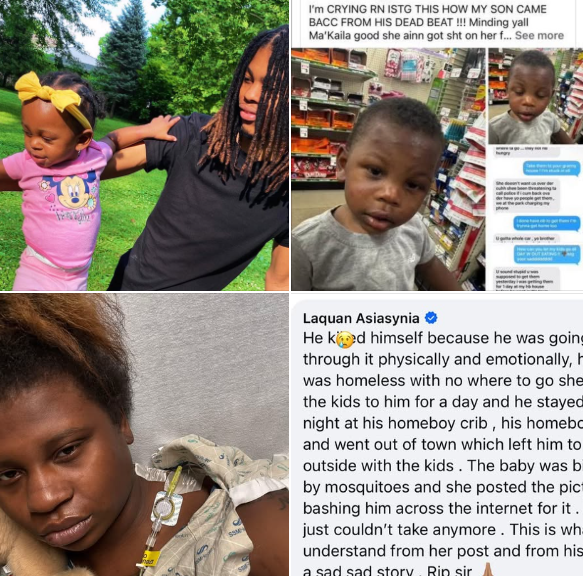Lamont, a homeless father of two, tragically took his own life after being publicly shamed on social media by his children’s mother. Lamont, who had already been struggling with depression, felt overwhelmed by the situation, leading to his heartbreaking decision.
The incident unfolded when Lamont, who had agreed to take care of his children for a night, found himself in a dire situation. He had planned to stay at a friend’s place, but when the friend left and the children’s mother did not return as expected, Lamont and his children were forced to sleep outside. His young son was severely bitten by mosquitoes during the night, adding to the stress and discomfort of the situation.
The following day, Lamont discovered that his children’s mother had posted on social media, criticizing him as a bad father. The posts, which Lamont had not expected, left him feeling deeply hurt and hopeless.
Final Message and Suicide
In a state of emotional distress, Lamont took to Facebook to leave a final message for his children. “Sorry Makaila & Karson 💔 Daddy loves y’all,” he wrote, before tragically ending his life.
Lamont’s death has sent shockwaves through those who knew him, and the impact of the public shame on his mental state has sparked discussions about the emotional toll of online shaming and the struggles that homeless parents face.
Community and Family Reactions
Lamont’s family and friends are grappling with the loss of a father who was clearly struggling but was also deeply invested in his children’s lives. Social media users, particularly those close to Lamont, have expressed their disbelief and sorrow over the incident.
“He was a good dad, but the public shaming pushed him too far,” said a close friend. “People need to realize the power their words can have on someone’s life. He didn’t deserve to go this way.”
The situation also highlights the challenges faced by homeless individuals, especially parents trying to care for their children without the resources or support they need. The emotional weight of the public humiliation, combined with Lamont’s existing depression, proved too much for him to bear.
The Role of Social Media in Mental Health
The tragedy has led to a renewed conversation about the harmful effects of online shaming and the mental health of individuals who already face emotional or financial struggles. Many mental health advocates are urging people to think carefully before posting hurtful or inflammatory comments about others, especially in public forums like social media.
“We often underestimate how much our words can hurt,” said Dr. Emily Jacobs, a clinical psychologist. “Social media is a powerful platform, but it can also be a tool of destruction if used irresponsibly. For people already struggling with depression or difficult circumstances, public shaming can feel like the final blow.”
Call for Support and Understanding
Lamont’s tragic death has prompted many to call for greater awareness and support for individuals facing homelessness, mental health issues, and family struggles. The public response has sparked a broader discussion about how society treats the most vulnerable members and how we can support people in crisis before it’s too late.
“We need to be more compassionate and understanding,” said one family member. “Sometimes people need a helping hand, not judgment. Lamont was trying to do his best, and he just got caught in an unfortunate situation.”
Raising Awareness and Preventing Future Tragedies
In the wake of Lamont’s death, family members and friends are calling for greater attention to the mental health of homeless parents and the damaging effects of online shaming. They hope that by sharing Lamont’s story, they can raise awareness about the emotional struggles of those who often don’t have the support system they need to cope with life’s challenges.
Lamont’s tragic end also serves as a reminder of the importance of reaching out for help when dealing with depression, stress, and mental health crises. Experts emphasize that if someone you know is going through a tough time, offering empathy and support is essential to helping them through.
Conclusion
The death of Lamont, a homeless father who was trying his best to care for his children, is a heartbreaking reminder of the vulnerability of those living in difficult circumstances. The incident underscores the importance of mental health awareness, the power of social media, and the need for greater compassion in our communities.
As Lamont’s family mourns his loss, they hope that his story will prompt a wider conversation about the harm caused by online shaming and the mental health challenges faced by homeless individuals. It is crucial that we continue to support those in crisis and remember the impact that our words and actions can have on others.
Mental Health Support
If you or someone you know is struggling with depression or suicidal thoughts, please reach out for help:
-
National Suicide Prevention Lifeline: Call 988
-
Crisis Text Line: Text HELLO to 741741
-
Mental Health Resources: www.mentalhealth.gov
No one should feel alone during their darkest moments. Help is available, and people care.

